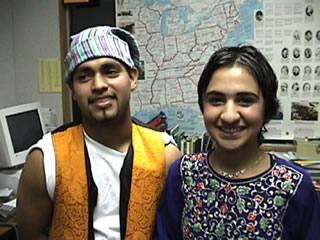Note: This text is a transcript of a tape recorded conversation between the Carnegie Quest team and Phil Levien.
Context
About Me
I acted in New York and California for about 20 years. During
that time, my wife and I were living in West Hollywood. When our
son was quite young I noticed something in the paper saying that
if your kids grow up in LA, after 10 years they’d have diminished
lung capacity, and that
started me thinking. I talked to my wife, and she was a screenwriter,
so she could do that work anywhere, but for me being an actor,
doing that would be difficult out of town. It took us about
5 years, and I came to feel that the
business itself was not life-affirming, but art is supposed to
be; that was a tension that I felt. I’d
think about, “What
would I do if I didn’t act?” I thought about producing
and directing, but I’d have more of similar issues.
I thought about what was the last thing I’d done—I’d
made a living acting for a number of years, when I started out
I scooped ice cream, cleaned apartments, but I’d never
done anything for money other than act. But I was a camp
counselor for about 5 years in New Hampshire and I thought, well,
I really loved doing that, maybe I should try to teach. When
I was in college, my first year or two I was so interested in
writing, and I thought I would be an English teacher and write,
in addition to teaching English. So it’s funny how I came
back to this original thing. Junior year I discovered acting.,
and it was like breathing for the first time, so teaching and
writing fell by the wayside.
My family moved to Santa Barbara,
where my wife’s family was. I came to UCSB, and
got an MA in dramatic art, and thought that would be enough to
teach. I'd been teaching for one year
in LA, as an assistant in a fourth grade classroom, and I
loved it. It
was a little private school called Crossroads…. My colleagues
there said, “If
you’re going to teach, don’t study teaching, study
something you really love.” So I got the MA in dramatic
art, graduated, with the MA, and started looking for work, and
I thought, “Oh,
I really blew it, because now I need to get a credential.” So
I taught acting from K-6, I did some other things, and then went
at night to get my credential. Ironically at that point I started
getting movies! At this point, I didn’t even care
about it that much… I wasn’t pursuing it, they weren’t
big roles, but it was lucrative. I wrote 3 papers for grad
school and read several books while I was on the set, and it
paid for my grad school.
And those things come to bear as the project unfolds,
you do whatever you need to do to get the show on. When you
teach a class, you do whatever you need to do to move the students
through the curriculum. You rely on whatever skills you brought
to the job to the first place.
About My School
Everyone thinks Santa Barbara is a rich community, and it is—we
have a lot of middle class who grew up here, and then there’s
a lot of the new arrivals, or kids from the minority community,
mostly Latino. There are few black students, typically
one or two in my class. San
Marcos High School is about 2000 students, we’re one
of three high schools in Santa Barbara, all about the same size. We’re
the only one on the block schedule. As a teacher, I find
it very helpful, and as a parent I think it was wonderful for
my daughter. She said the 90 minutes gave her a lot
more time to ask questions in class, the teachers had time to
answer, they only have to focus on a few things at any one time. As
a teacher, for the play, in a 90 minute class we can get the
play done. If we had a 50 minute class it would be really
hard.
I teach the transition class for the
ELD department, "Types of Literature", and we do work in different
genres, and I conduct it like an English class as opposed to an
ELD class. I also teach English 11 and Playwriting. I developed
the Sheltered Theater Production as a way to get different groups
of kids working together, developing their English, and making
a stronger connection to school.
At my school, there’s
been an attempt to mainstream kids as opposed to warehousing
them, and I really agree with that idea. A few years ago
the administration said, “We’re
going to send you five severely handicapped kids.” And
one was profoundly autistic, I don’t think he ever said
anything other than a grunt. Then we had a boy in a chair. He
was language minority, in a chair, developmentally delayed, speech
impaired. In total, we had five
kids who were severely challenged, who came with an aide. A few people had some concerns (and they were legitimate), they
thought that the ELD kids are struggling enough and then you’re
adding this other thing to it, and I just thought, “Well,
I want to accommodate these kids, I agree with it philosophically,
I think the other kids will be fine.” We had about
22 ELD and then 5 special ed with the aide. My students
have been great together. The
ELD kids are so soulful, they’ve got their own struggles
in life, that’s true, but it makes them really accepting
of all kinds of people. We've had some wonderful happy
accidents with the acting, and we get the kids involved at whatever
level they can be involved in.
